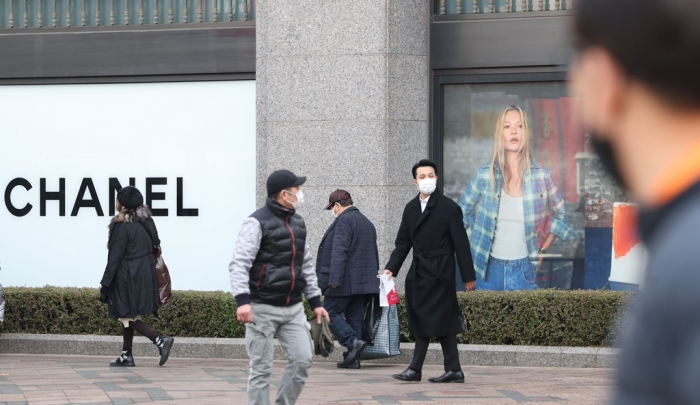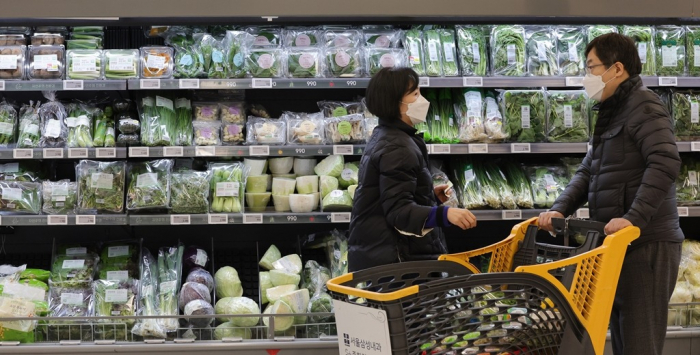Slowing economy slams S.Korean retailers; outlook dim
Consumer sentiment is unlikely to see a trend recovery anytime soon as the economy deteriorates
By May 10, 2023 (Gmt+09:00)
LG Chem to sell water filter business to Glenwood PE for $692 million


Kyobo Life poised to buy Japan’s SBI Group-owned savings bank


KT&G eyes overseas M&A after rejecting activist fund's offer


StockX in merger talks with Naver’s online reseller Kream


Mirae Asset to be named Korea Post’s core real estate fund operator



South Korean major retailers are suffering from a slowdown in Asia’s fourth-largest economy, adding to concerns about weaker earnings in the coming months due to sluggish consumption.
Profits declined at major department stores, which until recently enjoyed strong demand for luxury goods among young consumers. Earnings of lower-end retail shops such as hypermarkets also fell.
Shinsegae Inc., operator of Korea’s second-largest department store, on Wednesday said its operating profit slumped 6.8% to 152.4 billion won ($115 million) in the first quarter from a year earlier on a consolidated basis.
Sales at its department store unit grew 6.1% to 620.9 billion won but sales volume was unlikely to have risen given price hikes of luxury goods amid accelerating inflation, industry sources said.
Shinsegae’s smaller rival Hyundai Department Store Co. also said on Tuesday that its operating profit dropped 12.4% to 77.9 billion won in the January-March period.
Such poor performance came as the wealthy tightened their belts, hurting sales of luxury goods, industry sources said. Some deep-pocketed customers went abroad for vacations as most COVID-19 restrictions lifted, which meant fewer of the wealthy shopping at home. Compounding this was a worsening consumer sentiment amid rising interest rates, accelerating inflation and a weakening local property market.
The country’s top three department stores — Lotte Department Store, Shinsegae and Hyundai — were each estimated to have seen only single-digit growth in sales of luxury goods in the first quarter, according to industry sources. Those premium stores logged sales increases of more than 30% during the same three months of 2022.
HYPERMARKETS, CONVENIENCE STORES
Overall consumer sentiment remained weak, denting profits of other retail sectors such as hypermarkets and convenience stores.
E-Mart Inc., the country’s largest hypermarket chain, was expected to report a 14.1% drop in the operating profit of its discount store unit to 79 billion won in the first quarter, according to SK Securities Co.

Its smaller competitor Lotte Mart was also predicted to suffer a 37.5% tumble in profit, the brokerage said.
GS Retail Co. said operating profits of its convenience store unit and supermarket division plunged by almost a third and a half, respectively. BGF Retail Co., which operates the country’s top convenience store chain, said its operating profit dipped 2.1%.
NO RECOVERY IN SIGHT
Consumer sentiment may improve slightly in May, given public holidays such as Children’s Day, but it's unlikely to lead to a trend recovery over the longer term, industry sources said.
“More people went out during the holidays this month and spent a relatively large amount,” said an official at a hypermarket. “That is not expected to result in better earnings in the second quarter, however, as average spending per person is declining.”
Korea has avoided a recession as the economy rebounded more than expected in the first quarter on strong private consumption, but its outlook remained gloomy amid sluggish exports.
Although slowing, inflation remained above the central bank’s long-term target, which caused the central bank to refrain from cutting interest rates.
“Consumer spending is shrinking as inflation reduced disposable income,” said Seo Ji-Yong, a business professor at Sangmyung University in Seoul. “The economy is deteriorating further, ramping up fears of stagflation, so consumers will become thriftier.”
Stagflation refers to a period of stagnant economic growth accompanied by persistently high inflation and a sharp rise in unemployment.
Write to Mi-Kyoung Lee and Kyeong-je Han at capital@hankyung.com
Jongwoo Cheon edited this article.
-
 Central bankBOK chief says rate cut premature despite slower growth
Central bankBOK chief says rate cut premature despite slower growthMay 03, 2023 (Gmt+09:00)
2 Min read -
 EconomyKorea avoids recession on strong consumption; outlook still tough
EconomyKorea avoids recession on strong consumption; outlook still toughApr 25, 2023 (Gmt+09:00)
2 Min read -
 EconomyKorean economy unlikely to rebound in H2; BOK may keep rate
EconomyKorean economy unlikely to rebound in H2; BOK may keep rateApr 13, 2023 (Gmt+09:00)
3 Min read -
 The Deep DiveS.Korea’s love of luxury ushers in 3rd wave of bling boom
The Deep DiveS.Korea’s love of luxury ushers in 3rd wave of bling boomFeb 09, 2023 (Gmt+09:00)
4 Min read -
 RetailSouth Korean millennials pay premium for authentic luxury items
RetailSouth Korean millennials pay premium for authentic luxury itemsMay 31, 2022 (Gmt+09:00)
4 Min read -
 Behind the ScenesSouth Koreans turned off by luxury fashion houses’ price hikes
Behind the ScenesSouth Koreans turned off by luxury fashion houses’ price hikesMay 11, 2022 (Gmt+09:00)
4 Min read -



